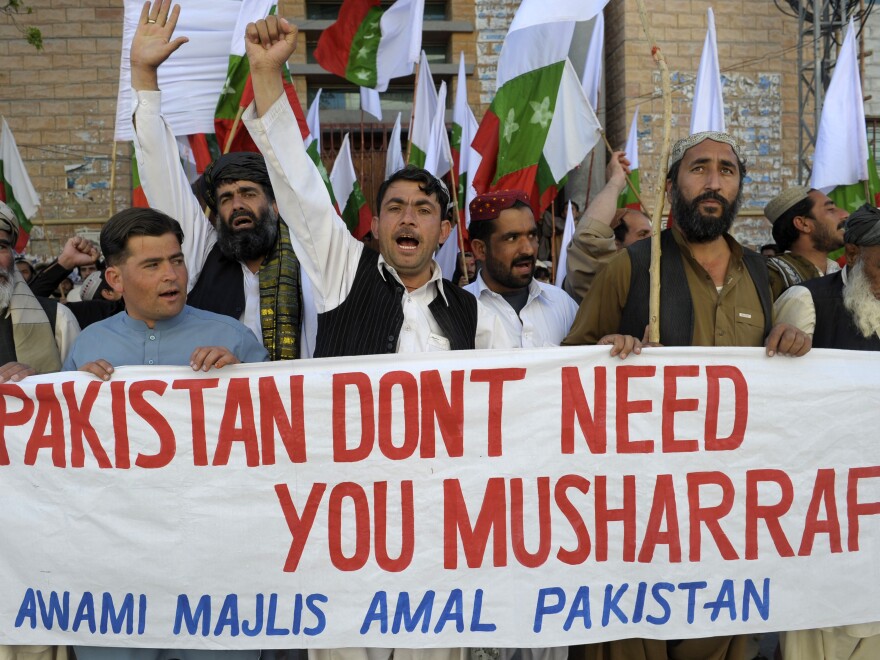The culling of candidates in the run-up to Pakistan's May 11 election is providing the country some badly needed levity.
The "Pakistani Inquisition," as it's been dubbed, has election commission officials grilling office-seekers on their Islamic bona fides.
Many have stumbled badly, only to be disqualified.
But not Mussarat Shaheen, who performed impeccably. The former dancer — fabled for her Pushto films — was asked by an official in the city of Dera Ismail Khan to recite a verse of the Holy Quran, to test her mettle as a candidate for the National Assembly.
The actress better known for her provocative moves than her piety rattled off a series of verses then wryly asked her inquisitor if he wanted to hear more. The sheepish official smiled and accepted her nomination papers.
An attorney in Lahore questioned the religious credentials of Shahbaz Sharif, the long-serving chief minister of the Punjab and younger brother of former prime minister and opposition leader, Nawaz Sharif.
The younger Sharif's transgression? Not wearing a beard. The country's frenzied media wasted no time in doctoring photos of Sharif sporting flowing facial hair.
Pakistan's Human Rights Commission said "a charade is being played out in the name of scrutiny of nomination papers," while the Pakistani daily The News International opined "how this will help us find legislators able to offer good governance is not clear."
Others suggested that the election commission benignly ignore the constitutional requirement ushered in during the 1980s military rule of Gen. Zia ul Haq that officeholders be knowledgeable of Islam.
But being sufficiently religious isn't all there is to prove.

Long Arm Of Justice Or Judicial Revenge?
Pakistan's Supreme Court has ordered the election commission to "ruthlessly scrutinize" whether office-seekers have paid their taxes, defaulted on loans or lied about their education. The Daily Times said that "the Court was of the view that an illiterate person would be acceptable in the elections, but not one who practiced deception."
Election officials report that the academic degrees of at least 54 lawmakers have been found to be bogus. Some have been fined, others jailed, some both. Scores more were told to verify their education credentials or risk being knocked out of the electoral contest.
The condition of a bachelor's degree or the equivalent, imposed by former military ruler Pervez Musharraf, is no longer in effect. But the erring parliamentarians are being hoisted with the petard of Article 62 of Pakistan's Constitution, which effectively disqualifies a candidate who is non-ameen, or "not truthful."
Aspiring candidates are taking full advantage of the elimination of the academic requirement, arguing that being honest is more important than being educated.
Boutique owner Zaheen Kanwal Mukhtar didn't finish high school, but is running in her hometown of Multan because, she says, "I'm giving voice to the voiceless in my constituency."
Musharraf would also like a voice again. He returned from exile hoping to stage a comeback, but may wish he hadn't.
Apart from a tepid homecoming, he has been put on Pakistan's exit-control list, which forbids him from leaving the country. The Supreme Court on Tuesday gave him until April 15 to respond to charges of treason.
He's also suffered the ignominy of being disqualified from the polls in Punjab province. Officials cited his failure to declare all of his assets and outstanding court cases against him, including allegations that he was complicit in the murder of former prime minister and opposition leader, Benazir Bhutto, a case being tried in an anti-terror court in Rawalpindi.

Musharraf still has three other venues in which to try to contest a seat. He could also appeal the disqualification in the Punjab. But columnist Cyril Almeida says the best punishment for the former strongman is "to allow him to come back to Pakistan and discover his own irrelevance."
The former president isn't the only big fry on the grill. The Sharif brothers are accused of accumulating wealth beyond their means and of defaulting on loans.
Denying the charge, an incensed Shahbaz Sharif announced if the brothers had been discovered defaulting on so much as a penny, he would "quit politics for good."
"The misinformation is ... deeply hurting millions of our supporters," the younger Sharif said.
The rejection of a former member of the National Assembly and prominent journalist, Ayaz Amir, was offensive to even those outside his party. He was disqualified for "writing against the ideology of Pakistan." No one seems quite sure what that "ideology" is, but "much mischief can and is being wrought in this undefined ideology's name," wrote the Daily Times.
Simple ignorance has tripped up other candidates. One parliamentary hopeful was disqualified after saying that Pakistan was created "in 1937." Correct answer: 1947.
Disqualifying tax dodgers in a country with a notoriously low tax base poses a significant question: who will be left to run?
It's reported that 70 percent of Pakistan's national parliamentarians do not pay taxes.
Some say the Supreme Court's zeal to scrub the candidate lists springs from its inability to bring to book most major politicians it considered either corrupt or in contempt of its rulings in the last four years since the court was restored.
Curbing Silliness
In what has been described variously as theater of the absurd and farce, a judge in Lahore has ordered election officials to refrain from asking candidates random and intrusive questions that have no bearing on their ability to govern.
One father was gratuitously asked which of his two children he liked more. A husband and wife, both office seekers, were asked who would run the household if the she were elected?
With or without the courts, the public, disillusioned with the wretched state of the economy and security, will decide whether to send the political class packing on election day.
Perhaps fearing that too many voters might avail themselves of the option, authorities have ruled against introducing another entry to the ballot: "None of the above."
Copyright 2021 NPR. To see more, visit https://www.npr.org. 9(MDEwMDkzMjQzMDEzNDc2MjU4NDA0M2ExOA004))




